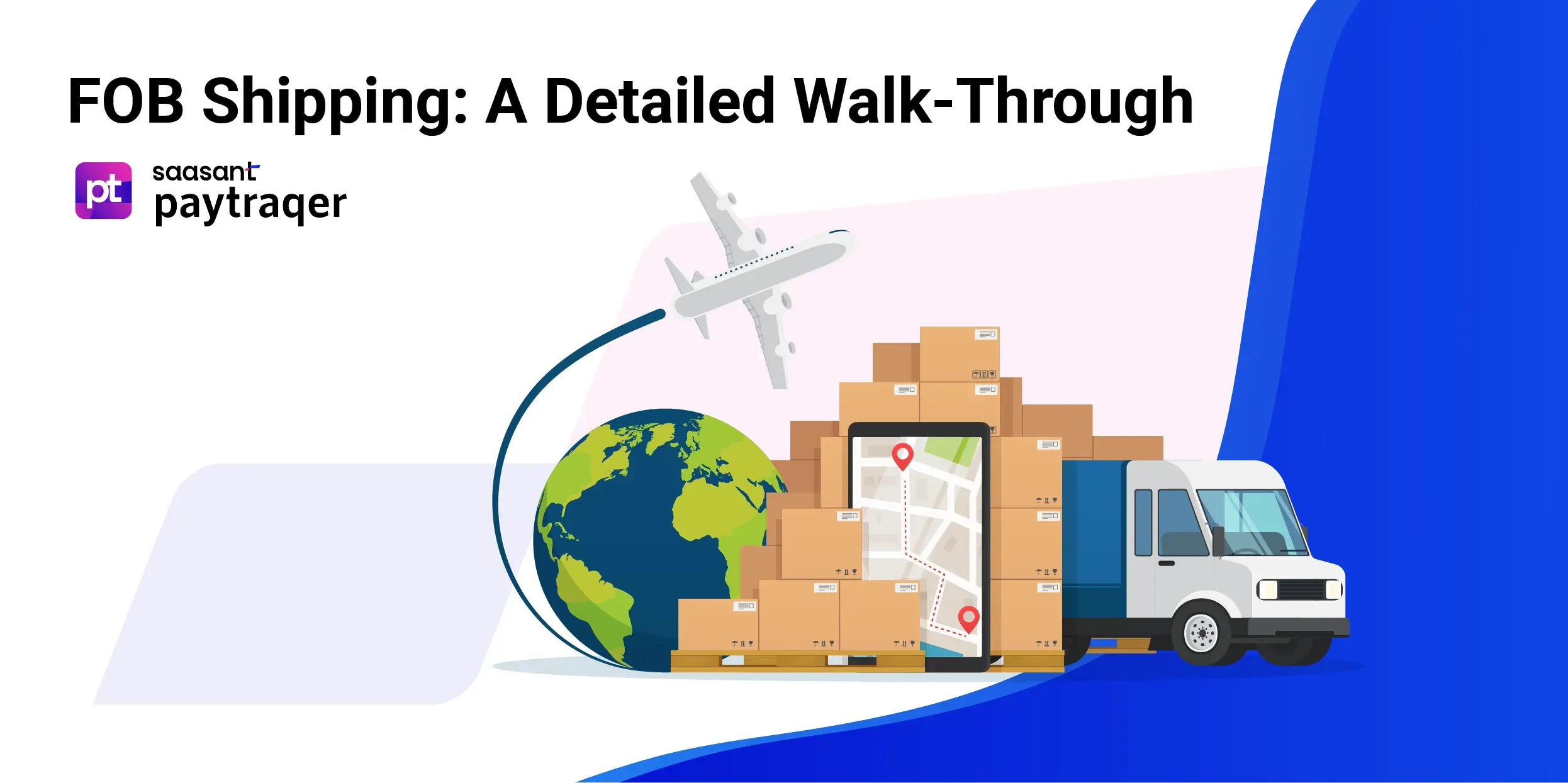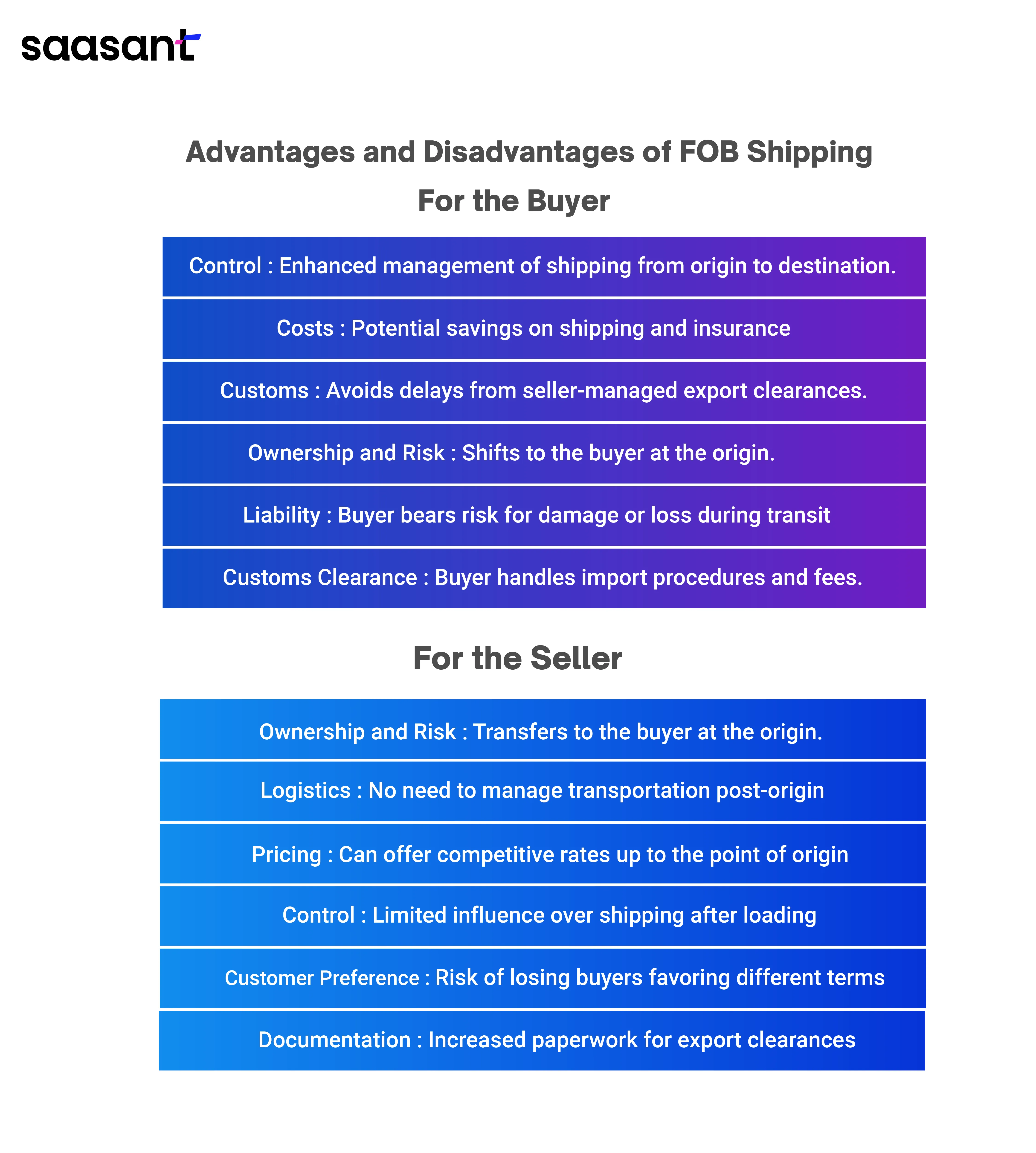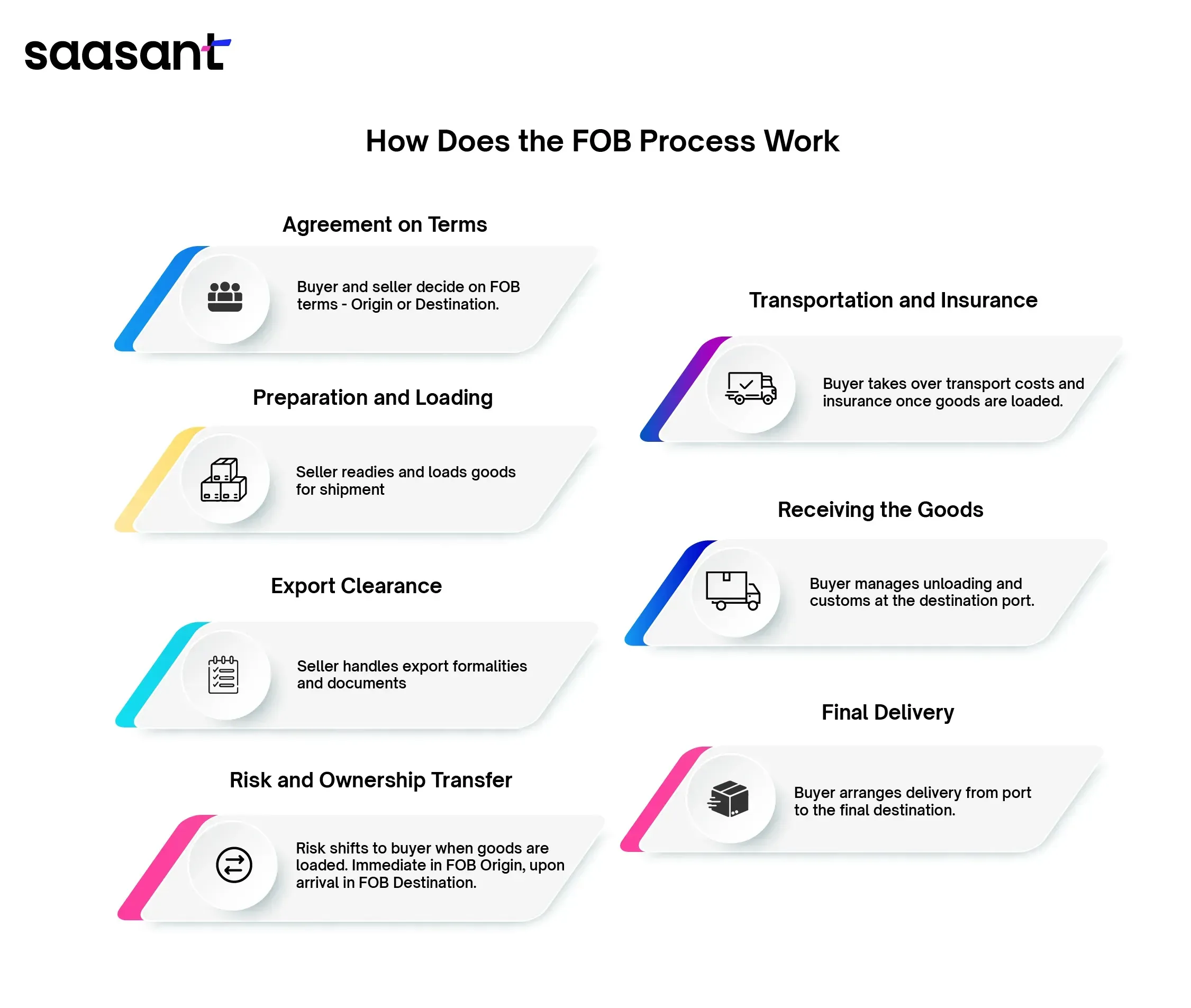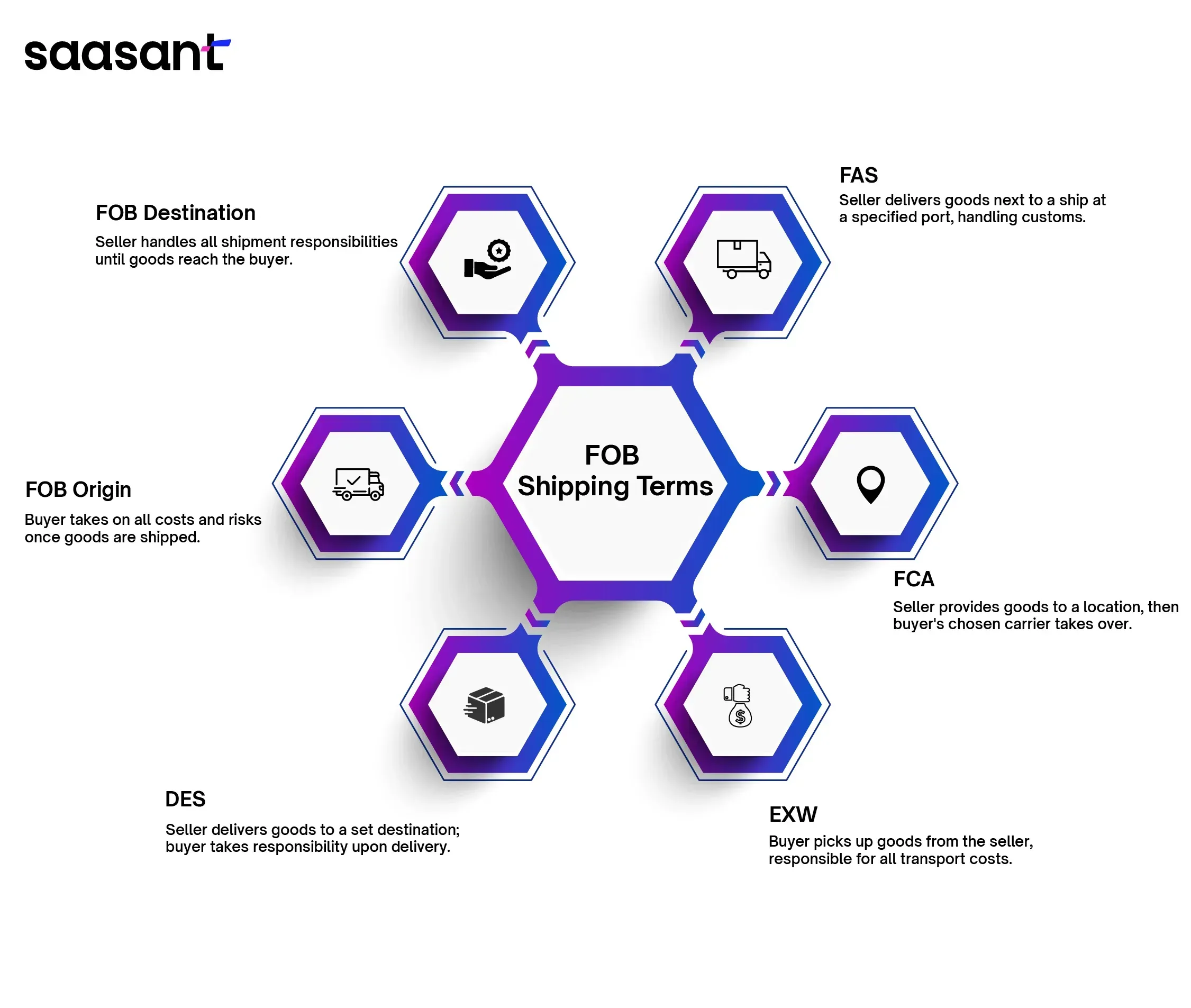FOB Shipping: A Detailed Walk-Through

Free On Board/Freight Board Shipping, AKA FOB Shipping, is a shipping term used to show if the seller or buyer is liable for the damage or destruction of products while shipped internationally.
FOB shipping is a crucial concept for businesses that ship goods internationally. It determines who takes charge of the shipment's cost and risk and affects the goods' accounting and taxation. Therefore, it is vital for both the buyer and seller to understand and agree on the FOB designation before signing a contract.
This blog will further walk you through FOB shipping, FOB destination, FOB origin, its benefits, different types of shipping, and much more.
Contents
What is FOB shipping?
How Does the FOB Process Work?
FOB Destination vs Shipping Point
Understanding FOB Terms
"Understanding FOB Destination: Ownership Transfer and Shipping Responsibilities"
Advantages and disadvantages of FOB Shipping
Choosing the Right FOB Shipping for Your Business
FAQs
What is FOB shipping?
FOB meaning: FOB shipping indicates when the ownership and risk of goods are transferred from the seller to the buyer during shipping. FOB is Free On Board or Freight On Board, one of the international commercial terms defined by the International Chamber of Commerce.

FOB shipping can be further divided into FOB destination and FOB origin.
FOB destination means the seller is responsible for the goods until they reach the buyer’s location. In contrast, FOB origin means that the buyer is responsible for the goods when they are shipped from the seller’s location.
FOB shipping affects the cost, liability, and accounting of the goods in transit. Therefore, it is crucial for both the seller and the buyer to understand and agree on the FOB terms before signing a contract.
How Does the FOB Process Work?
The FOB shipping process includes the responsibilities, costs, and risks between the buyer and seller, ensuring a smooth and precise transaction process. The FOB (Free On Board) shipping process involves several key steps:

Agreement on Terms: The buyer and seller agree on FOB terms, mentioning whether the responsibility and risk transfer at the origin (FOB Origin) or destination (FOB Destination).
Preparation and Loading: The seller prepares the goods for shipment, loads them onto the transport vehicle, and ships them to the location.
Export Clearance: The seller is responsible for clearing the goods for export and handling all customs formalities and documentation required in the country of origin.
Risk and Ownership Transfer: The critical point in FOB shipping is when the goods are loaded onto the vehicle. Risk and ownership transfer from the seller to the buyer at this moment. In FOB Origin, this transfer occurs as soon as the goods are loaded. In FOB Destination, the transfer happens when the goods reach the buyer's specified destination.
Transportation and Insurance: Once the goods are on board, the buyer assumes responsibility for the transportation costs and any insurance cover needed during transit from the port of origin to the destination.
Receiving the Goods: Upon arrival at the destination port, the buyer is responsible for unloading the goods and completing any necessary import customs clearances and duties.
Delivery to Final Destination: Finally, the buyer arranges for the goods to be transported from the port to their final destination.
FOB Destination vs Shipping Point
FOB Destination | FOB Shipping Point | |
Definition | The seller retains ownership and responsibility over the goods, including shipping costs, until they are delivered to the buyer's specified location. | Once the seller ships, the buyer assumes ownership and responsibility for the goods, including shipping costs. |
Responsibility for Shipping Costs | The seller is responsible for all shipping costs to the destination. | The buyer is responsible for all shipping costs from the origin. |
Risk of Loss | The loss remains with the seller until the goods reach the buyer's destination. | Transfers to the buyer once the goods are shipped or leave the seller's premises. |
Ownership Transfer | Transfers to the buyer upon delivery at the destination, along with the risk of loss. | Transfers to the buyer at the point of origin when the goods are shipped, along with the risk of loss. |
Price | Price typically includes shipping costs to the destination. | Price excludes shipping costs from the origin, which the buyer is responsible for. |
Best Suited For | Sellers want to maintain control and responsibility, including cost, until delivery is completed. | Buyers take control, responsibility, and cost for the goods as soon as they are shipped. |
Common Usage | Sellers offering a high level of service or in cases where the seller has better shipping rates. | Large volume or high-value transactions where the buyer prefers to control the shipping process and costs. |
Understanding FOB Terms
As both buyer and seller, it’s necessary to understand the FOB terms:

FAS or Free Alongside
This rule is specifically applicable to goods shipped via ocean or waterway. It is primarily used in overseas shipping and denotes that the goods have been delivered, offloaded, and cleared through customs. FAS assigns the seller the responsibility to deliver packaged goods alongside the arranged vessel at any designated port.
FCA or Free Carrier
Free Carrier signifies that the seller delivers goods to designated ports or locations. This means that the carrier or another person nominated by the buyer is wholly responsible for the shipment's delivery at the named place and premises.
EXW or Ex Works
Ex Works (EXW) is a shipping term that assigns most of the responsibility for collecting the goods or packages to the buyer. The buyer must collect and pay for the goods as soon as the seller indicates the order is ready, or the buyer must make payment only when the packages are received at an agreed-upon location.
DES or Delivered Ex-Ship
Delivered Ex-Ship is an international commercial term applicable to all shipping methods. It indicates that the seller must deliver the package shipments to the buyer at a predetermined destination. After the goods are delivered as agreed, the shipper assumes complete responsibility for the shipments.
FOB Origin
FOB Origin emphasizes the buyer's full responsibility once the goods are received at the designated port or destination. The buyer accepts responsibility for payments and risks once the goods are in possession. FOB Origin implies that the seller covers all transportation costs to bring the goods to the point of origin, while all other expenses, such as finance, customs, and taxes, fall under the buyer's responsibility once the shipment is received.
FOB Destination
FOB Destination places the responsibility entirely on the seller until the buyer receives the goods. This agreement ensures that all payments and legal obligations related to the shipment are the seller's until the goods reach the buyer.
FOB Incoterms
FOB Incoterms (International Commercial Terms) are international trade rules established by the International Chamber of Commerce (ICC) that govern the terms of sale for goods in international transactions. FOB stands for "Free On Board," indicating that the seller is responsible for delivering the goods to a specified port or point of shipment and loading them onto the carrier (like a ship or truck). Once the goods are loaded, the risk and responsibility are transferred from the seller to the buyer.
FOB Incoterms means the seller is responsible for the costs and risks of delivering the goods to the named port or point of shipment. This includes expenses such as transportation to the port, export clearance, and loading charges. Once the goods are on board the carrier, the buyer assumes responsibility for any further transportation costs, import clearance, and risks associated with the shipment.
FOB Incoterms are commonly used in maritime shipping but can also be used for other modes of transportation, such as air or rail. Both parties in a transaction must specify the chosen Incoterm, including FOB, in the sales contract to avoid misunderstandings regarding responsibilities, costs, and risks related to the shipment of goods.
"Understanding FOB Destination: Ownership Transfer and Shipping Responsibilities"
"FOB destination means title to the goods passes" refers to a shipping arrangement where the seller retains ownership and responsibility for the goods until they reach the buyer's designated destination. This includes covering transportation costs, risks, and potential damage during transit. It's a common arrangement in which the seller assumes more liability until the goods are delivered to the buyer's specified location, ensuring a smoother transfer of ownership and minimizing risks for the buyer.
Advantages and disadvantages of FOB Shipping
Here are some advantages and disadvantages of using FOB shipping, depending on whether you are the seller or the buyer.
FOB Shipping | Advantages | Disadvantages |
For the buyer |
|
|
For the seller |
|
|
Choosing the Right FOB Shipping for Your Business
Selecting the appropriate FOB (Free On Board) shipping terms is crucial for effectively managing your business's shipping costs, risks, and responsibilities. The choice between FOB Origin and FOB Destination impacts how logistics are handled, who takes charge of the shipping cost, and at what point the risk of loss or damage to goods transfers from seller to buyer.
If you prefer to control the shipping process, including choosing the shipping company and managing the shipping costs, FOB Origin may be more suitable. This option lets you negotiate directly with carriers and secure better rates or terms.
Choosing the proper FOB shipping depends on each business's needs, financial considerations, and risk, which plays a significant role in this decision. Ultimately, the decision on FOB terms should align with your business strategy, ensuring optimal efficiency in your supply chain operations.
Also, to determine who is responsible for shipping costs, it’s advisable to keep track of your expenses. Applications like QuickBooks or Xero can help streamline this decision-making process by providing clear financial insights and facilitating easier management of shipping-related costs.
Incorporating PayTraQer with your QuickBooks or Xero account can sync your sales and shipping costs from various payment platforms, such as PayPal, Stripe, Square, etc.
FAQs
Why Does FOB Shipping Matter?
FOB matters because it determines who is responsible for the cost and risk of the goods during shipping. Depending on the FOB terms, the seller or the buyer must pay for the transportation, insurance, customs clearance, and any loss or damage that may occur in transit. FOB also affects the accounting and taxation of the goods, as it defines when the revenue is recognized and who owns the inventory. Therefore, the seller and the buyer should understand and agree on the FOB point before signing a contract.
Who is responsible for the freight costs when the terms are fob shipping point?
The seller pays the shipping costs until the point of origin, at which point the buyer assumes responsibility for the shipment.
Who holds the risk at the FOB Destination point?
The seller holds the responsibility and risk of shipment at the FOB destination point.
What does FOB mean?
FOB stands for "Free On Board." It's a term used in international shipping contracts that specifies when the responsibility for the goods and any associated risks shift from the seller to the buyer. This typically happens when the goods are loaded onto the ship at the origin port.
Does FOB mean free shipping?
FOB means the seller will not bear the costs; the buyer pays the respective fees.
What does the fob shipping point mean?
FOB Shipping Point means Free On Board Shipping Point, which means an explicit agreement between the buyer and seller regarding the legal responsibility, transport of goods, customs clearance, etc. If the buyer is responsible for paying the freight costs of delivering merchandise, the delivery terms are typically stated as "FOB shipping point" or "FOB origin." This means that the buyer assumes ownership and responsibility for the goods as soon as they are loaded onto the carrier at the point of shipment.
Who pays the freight costs when the terms are FOB shipping points?
The seller pays transportation and shipping costs to get the goods to the point of origin. After that, it becomes the buyers’ responsibility.
Who pays the freight in FOB shipping?
The seller is obligated to pay freight under FOB shipping.
How do you calculate fob shipping?
FOB Value: Ex-Factory Price + Other Costs.
Other costs include packing the goods, shipping charges, service charges, etc.
What does FOB price refer to in international shipping?
FOB price, or Free On Board price, marks where the seller's responsibility ends and the buyer's begins. It covers costs up to loading goods onto the vessel at the port of shipment, excluding additional expenses like insurance and customs duties, which are usually the buyer's responsibility.
What does free on board mean?
"Free On Board" (FOB) is a shipping term that indicates the point at which the seller's responsibility for goods ends and the buyer's responsibility begins. It typically refers to where the goods are loaded onto a carrier, such as a ship or truck, and includes the cost of transporting them to that point. Once the goods are loaded, any risk or damage is usually the buyer's responsibility. FOB terms can vary, with "FOB shipping point" meaning the buyer takes responsibility at the point of shipment and "FOB destination" meaning the seller remains responsible until the goods reach the buyer's specified destination.
What is FOB in contract law?
FOB in contract law refers to the Free On Board terms commonly used in international trade agreements. It specifies how responsibility and liability for goods transfer from the seller to the buyer. In FOB contracts, the seller is responsible for delivering the goods to a specified location and loading them onto the carrier. Once the goods are loaded, the risk shifts to the buyer, who is then responsible for transportation costs and any damage or loss during transit
What does FOB mean on an invoice?
"FOB" on an invoice refers to the shipping terms used to sell goods. It indicates whether the seller or the buyer is responsible for the shipping costs and risk of loss or damage during transit. If an invoice specifies "FOB shipping point," the buyer is responsible for transportation costs and assumes risk once the goods are shipped. On the other hand, "FOB destination" indicates that the seller is responsible for shipping costs and risk until the goods reach the buyer's specified destination.
What happens when merchandise is delivered to the FOB shipping point?
When merchandise is delivered to the FOB (Free On Board) shipping point, the buyer assumes ownership and responsibility for the goods as soon as they are loaded onto the carrier at the end of shipment. Here's what typically happens in this scenario:
Transfer of Ownership: The ownership of the merchandise transfers from the seller to the buyer at the shipping point. This means that the buyer bears any risks associated with the goods, such as damage or loss during transit.
Transportation Costs: The buyer is responsible for paying transportation costs from the shipping point to the final destination. This includes freight charges, insurance, customs duties, and any other expenses related to transporting the goods.
Risk of Loss: Since the buyer assumes ownership at the shipping point, they also risk losing or damaging the merchandise during transit. The buyer must arrange suitable insurance coverage to protect against such risks.
Documentation and Clearance: The buyer is responsible for handling all documentation, customs clearance, and any other formalities required for the merchandise to reach its destination. This includes obtaining necessary permits, paying import duties, and complying with legal requirements.